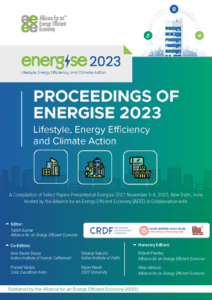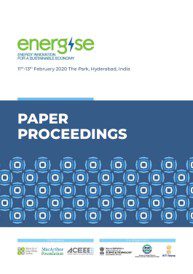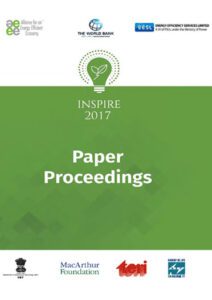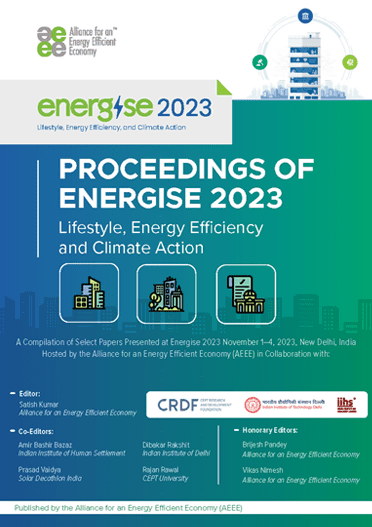Lifestyle, Energy Efficiency, and Climate Action
Associated Journal for Special Issue
Proceedings of Energise 2023
The proceedings of Energise aims to create a pivotal platform for professionals addressing energy and sustainability challenges specific to evolving economies, allowing their findings to resonate with both national and international audiences. Such proceedings will cultivate broader understanding amongst the global academic, engineering, and planning communities about the distinct challenges faced by nations like India. Introducing fresh perspectives to these multifaceted issues will pave the way for innovative solutions. We anticipate that in time, scholars, engineers, and planners globally will be drawn to these challenges, fostering collaborative solutions. This mutual exchange between professionals from developed and developing economies will foster a deeper comprehension of energy and sustainability issues universally. As Energise proceedings evolve, it is poised to become a premier platform where global thought leaders will be eager to showcase their insights. While the proceedings aim to spotlight challenges predominant in developing economies, it will encompass all facets of energy and sustainability. Click here to view the past proceedings –
https://energiseindia.in/2023/energise2020/energise-2020-conference-proceedings/

Energy Efficiency First Journal
Energy efficiency, a cornerstone in the realm of scientific innovation, not only serves as a bedrock of sustainability but also plays a pivotal role in shaping various human activities across an array of fields and industries. Its vastness and multi-dimensional nature, while being its strength, also make it intricate, often leading to challenges in capitalizing on its complete potential and wide-scale implementation. “Energy Efficiency First” stands at the forefront of this challenge. By striving to bring definition, coherence, and spotlight to the diverse studies and applications associated with energy efficiency, the journal endeavours to provide a platform that bridges gaps, stimulates discourse, and fosters innovation, enriching research paradigms, fuelling economic progress, and fortifying societies across the globe. Our primary focus aligns with the global urgency—mitigating climate and environmental threats, adeptly navigating the complexities of energy transitions, and championing the cause of inclusive and sustainable growth for all. Diving deeper, our extended editorial encompasses a journey through the annals of energy efficiency’s storied past, meticulously tracing its evolution. By weaving together historical insights and modern perspectives, we aim to construct a holistic and ground-breaking framework, deeply anchored in foundational principles. This not only sets the stage for robust scholarly debates but also forms the basis for actionable solutions. Further, the editorial elucidates the vision, ambition, and the driving forces that birthed this unique venture, casting a light on our unwavering commitment to pushing the boundaries of what’s possible in the realm of energy efficiency.






 Bishal Thapa
Bishal Thapa





 Fred Sherman
Fred Sherman Sumedha Malaviya
Sumedha Malaviya Satish Kumar
Satish Kumar












 The three main global energy concerns of providing access to modern energy, enhancing the security of the energy supply, and minimising the impact of energy systems on the climate have an impact on both national and international energy governance. To develop solutions that address the many facets of these difficulties, however, a variety of actors and stakeholders must be included due to the complexity of the energy challenges.
The three main global energy concerns of providing access to modern energy, enhancing the security of the energy supply, and minimising the impact of energy systems on the climate have an impact on both national and international energy governance. To develop solutions that address the many facets of these difficulties, however, a variety of actors and stakeholders must be included due to the complexity of the energy challenges. Cities are responsible for more than 70% of the world’s energy consumption and 40% to 50% of its greenhouse gas emissions. Managing increasing urbanisation is a challenge, and nations must deal with the effects it will have on the environment in terms of energy and climate.
Cities are responsible for more than 70% of the world’s energy consumption and 40% to 50% of its greenhouse gas emissions. Managing increasing urbanisation is a challenge, and nations must deal with the effects it will have on the environment in terms of energy and climate. Our transition to a future with lower carbon emissions depends heavily on buildings. They are our places of residence, rest, and employment; they also account for around one-third of the world’s greenhouse gas emissions and nearly 40% of the world’s energy usage.
Our transition to a future with lower carbon emissions depends heavily on buildings. They are our places of residence, rest, and employment; they also account for around one-third of the world’s greenhouse gas emissions and nearly 40% of the world’s energy usage.